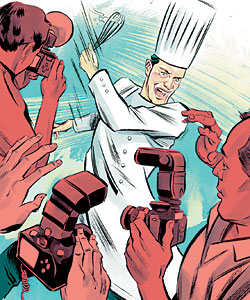
I began writing about food partly because it was one of the last cultural beats where interview subjects weren’t inaccessible, coddled divas. If you wanted to talk to a chef, you met him for a beer or dropped by his kitchen. I once bumped into Emeril Lagasse at a convention and had a long conversation (I have the “Mike. Bam. Emeril” autograph to prove it), and in 2005 I met the Food Network’s poster boy, Alton Brown. Both men answered endless questions, never once motioning for security.
This fall, Brown blogged a 1,250-word “fanifesto,” laying out rules for interacting with him: no camera phone pictures, no cleavage autographs, and no urinal chats. I’m OK with that last one. But it’s time to call bullshit on the concept of celebrity chef.
Lagasse and Brown may be bona fide stars, but their fame has paved the way for a culture in which Graham Elliot’s publicist insists you submit interview questions via e-mail because Elliot, chef/owner of Graham Elliot and Grahamwich, is so busy—and, according to Jim Colombo, a former Graham Elliot publicist, even The New York Times complies. I’m willing to give Elliot a pass; he was once the youngest four-star chef in the country. The breaking point for me came this summer, and its name was James Toland. A chef best known locally for a brief stint at Lockwood, Toland felt qualified to print his name on every awning of The Black Sheep, his West Town restaurant that opened in June. It closed 92 days later. The lowest moment of its brief run was when an unverified post turned up on Time Out Chicago’s online message boards under the name Chef James Toland and called a TOC critic a derogatory epithet following her two-star review of The Black Sheep. (Toland told Eater.com he was hacked.) Maybe he really was hacked, but based on the fact that his staff walked out multiple times, the real problem may have been opening this restaurant in the first place. (Toland had no comment.)
Even more distasteful may be Chuy Valencia of Chilam Balam. Building a successful farm-driven Mexican restaurant doesn’t grant you the right to run around boasting of having sex with ten women in a week or “mindfucking” the world with food in between pregnancy/STD scares, as Valencia did in his now-infamous Top Chef Texas audition video. (Watch “Meet Chuy Valencia.” You’ll want to wash your monitor afterward.) This kind of talk may score points with Top Chef watchers, but instead of dreaming about Valencia’s silky mole rojo, I want to set up a Planned Parenthood chapter for the show’s female contestants.
My hands are not clean. Every time Michael Carlson cancels a slew of reservations at Schwa on a whim, we food writers say, He so crazy! and then blog about his genius. Brandon Baltzley, the self-proclaimed “most written about nonproductive chef in Chicago,” whose biggest claim to fame was his trip to rehab, saw his rise fueled by a June Tribune story chronicling his drug problems. “This is my livelihood,” explains Baltzley, cocreator of Crux, a monthly pop-up dinner. “So I’m gonna go with it [the press].” The November issue of Details profiles him, and Baltzley says he has a book and a film pending. It’s hard to blame the guy for feeding the beast. I am among those being fed.
It looks like Baltzley has turned his life around, and even though his latest gig, at Pensiero Ristorante, lasted a mere six weeks, he remains committed to Crux: “There were four guys cooking in my studio apartment [for a recent dinner], sleeping only 20 minutes for three days, because we wanted to live up to the expectation,” he says. Now that’s rock-star honesty. Nothing against self-promotion, but when a chef speaks louder with his mouth than with his cooking, we all lose.
Illustration: Kagan McLeod


